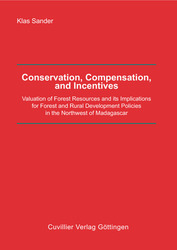| Fachbereiche | |
|---|---|
| Buchreihen (96) |
1381
|
| Nachhaltigkeit |
3
|
| Gesundheitswesen |
1
|
| Geisteswissenschaften |
2370
|
| Naturwissenschaften |
5408
|
| Mathematik | 229 |
| Informatik | 319 |
| Physik | 980 |
| Chemie | 1364 |
| Geowissenschaften | 131 |
| Humanmedizin | 243 |
| Zahn-, Mund- und Kieferheilkunde | 10 |
| Veterinärmedizin | 108 |
| Pharmazie | 147 |
| Biologie | 835 |
| Biochemie, Molekularbiologie, Gentechnologie | 121 |
| Biophysik | 25 |
| Ernährungs- und Haushaltswissenschaften | 45 |
| Land- und Agrarwissenschaften | 1005 |
| Forstwissenschaften | 201 |
| Gartenbauwissenschaft | 20 |
| Umweltforschung, Ökologie und Landespflege | 148 |
| Ingenieurwissenschaften |
1795
|
| Allgemein |
98
|
|
Leitlinien Unfallchirurgie
5. Auflage bestellen |
|
Erweiterte Suche
Conservation, Compensation, and Incentives
Valuation of Forest Resources and its Implications for Forest and Rural Development Policies in the Northwest of Madagascar
Klas Sander (Autor)Vorschau
Inhaltsverzeichnis, Datei (50 KB)
Leseprobe, Datei (61 KB)
Economic analyses are increasingly applied as an analytical tool to identify efficient and sustainable forest management strategies. These analyses often chose a macro-level approach which – representing the viewpoint of a social planner – emphasize the considerable economic benefits that can be gained from intangible forest benefits, such as the conservation of biodiversity or recreational values. As a result, a commonly proposed policy outcome is the creation of protected areas (PA). In contrast to providing intangible economic benefits, the establishment of PA often imposes significant tangible opportunity costs to households living adjacent to a PA. These opportunity costs arise from a restricted access to the resource and is most strongly pronounced in rural areas of developing countries, where a majority of households generally depends on the access to natural resources to support their livelihoods. These costs are represented by the benefits forgone from the direct extraction of forest products and the conversion of forests for agricultural production. This situation applies especially to the case of Madagascar, where this study was executed. On the one side, the Government of Madagascar has chosen a strict conservation approach as the guiding principle of natural resource management to conserve the endemic biodiversity on the island. On the other side, Madagascar is among the poorest countries in the world and has recently fallen even deeper into poverty. This increases the need for developing natural resource management policies that not only achieve biodiversity conservation, but also contributes to poverty alleviation at the same time. Therefore, a complete and accurate assessment of these opportunity costs is critical for two reasons: a) an improved assessment of opportunity costs will significantly enhance the analytical power of economic analyses and, b) improved data of such opportunity costs represent a key component for a successful implementation of compensation mechanisms.
| ISBN-13 (Printausgabe) | 3865378684 |
| ISBN-13 (Printausgabe) | 9783865378682 |
| ISBN-13 (E-Book) | 9783736918689 |
| Sprache | Englisch |
| Seitenanzahl | 222 |
| Auflage | 1 |
| Band | 0 |
| Erscheinungsort | Göttingen |
| Promotionsort | Göttingen |
| Erscheinungsdatum | 24.05.2006 |
| Allgemeine Einordnung | Dissertation |
| Fachbereiche |
Land- und Agrarwissenschaften
|








